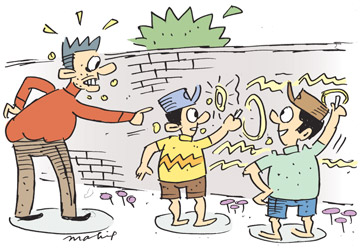|

by R. S. Karunaratne
How to use modal verbs
[Part 2]
Modals are a type of auxiliary or helping verbs. Today let's learn
how negative statements and questions are made using modal verbs.
We use 'must not' or its contraction 'mustnt' to change a modal to its
negative form.
|

You must not board a moving train. |
We must not laugh at old people.
We mustn't misuse the office telephone.
You're using your mobile phone while driving. You mustn't break the law!
You must not board a moving train.
We mustn't postpone the trip to Kandy.
You must not write anything on currency notes.
We use 'should not' or its contraction 'shouldn't' to change a modal to
its negative form.
You shouldn't be here at this time!
Children should not deface walls.
Doctors shouldn't leave their motherland.
We use 'need not' and its contraction 'needn't' to change a modal to its
negative form.
As you have lost your job, you need not buy me any present for my
birthday.
You needn't wait for me after the show.
We use 'ought not to' to change a modal to its negative form.
Sam ought not to waste his time on the beach.
Note: The word 'not' is used immediately after all modals except
'can.' The negative form of 'can' is 'cannot.' Here's a list of
negatives and their contracted forms.
cannot : can't
could not : couldn't
must not : mustn't
need not : needn't
shall not : shan't
should not : shouldn't
will not : won't
would not : wouldn't
Note: 'May not, might not' and 'ought not to' cannot be contracted.
[Question forms]
|

Children should not deface walls. |
You can begin a question with a modal but it must have a subject.
Can I use the telephone?
Could I sit here for a while?
Shall I pay only the admission fee now?
Should we wait here for some more time?
Must I sign all these documents?
May I come in?
Will you wait for me?
May we join the party?
Note: The modal 'shan't' is not used in questions.
[Activity]
Underline the correct words in the brackets to complete the following
sentences.
Check your answers with the key.
1. Would you (agree/agreed) to donate Rs 10,000 for the building
fund?
2. Shouldn't Sama (go/went) abroad for higher studies?
3. Might the chairman (override/overriding) the director's decision on
this matter?
4. Will the beauty pageant (be televised/televised) worldwide?
5. Must we (get/got) the board approval to go abroad?
6. (Can/Would) you change a Rs 5,000 note?
7. May I (be exempted/exempted) from certain subjects?
8. Shouldn't you (read/be reading) the conditions before signing the
contract?
9. Can I (use/be using) the lift?
10. Should Mary (appointed/be appointed ) to the vacant post?
[Key]
1. agree 2. go 3. override 4. be televised 5. get 6. Can 7. be
exempted 8. read 9. use 10. be appointed
Word game
There are many English words derived from Greek. If you know the
meaning of Greek word parts, you will be able to understand the meaning
of certain English words.
In the following quiz we give a list of Greek word parts with their
meanings in column 'A'. Write the relevant English word in column 'B'.
The first one has been done for you.
Check your answers with the key.
[Column A] [Column B]
1. meter (measure) diameter
2. metry (measure) ...............
3. micro (small) ...............
4. mono (one) ...............
5. myth(o) (story) ...............
6. onym (name) ...............
7. opto (eye) ................
8. para (beside) ...............
9. peri (around) ...............
10. phone (sound) ...............
11. phono (sound) ...............
12. phony (sound) ...............
13. photo (light) ...............
14. physio (nature) ...............
15. psych(o) (mind) ...............
16. scope (view) ...............
17. sphere (round) ................
18. steth(o) (chest) ...............
19. sym (with) ...............
20. syn (with) ...............
21. tele (far) ...............
22. theo (god) ...............
23. therm(o) (heat) ...............
24. topo (place) ................
25. zoo (animal) ................
[Key]
2. geometry 3. microphone 4. monologue 5. mythology 6. synonym 7.
optometry 8. paragraph 9. perimeter 10. telephone 11. phonograph 12.
symphony 13. photograph 14. physiology 15. psychology 16. telescope 17.
atmosphere 18. stethoscope 19. sympathy 20. synonym 21. telegraph 22.
theology 23. thermometer 24. topography 25. zoology.
Starters:
Use of prepositions
[Part 13]
Although there are a little over 100 prepositions, beginners find it
difficult to use them correctly. Today let's learn how to use some more
prepositions.
[Except for] 'Except for' is used to introduce the only things or
people that the main statement does not apply to. I thought I recognised
everybody in the room except for one man in a black coat.
[Excluding]
We use 'excluding' to introduce somebody or something that is not
part of a group that we are talking about.
Excluding Greenland and Antarctica, the world has 13.15 billion
hectares of land.
[Following]
'Following' an event means after that event. All the roads leading to
the city have been closed down following a bomb blast. The business
establishment was reorganised following the resignation of the board of
directors.
[For]
|

I thought I recognised everybody in the room except for one
man in a black coat. |
'For' is a very useful preposition used in different contexts.
]If you do something for somebody, they will benefit from it.
Father is doing all this for you because he loves you.
Here's a brand new camera. It's for you!
My uncle came to my birthday party with a present for me.
If you work for a business establishment, they employ you.
I have been working for a publishing company since 1980.
We use 'for' when stating the purpose of an object or action.
The Sri Lanka Law College is the best place for your legal studies.
A detective is waiting for you.
The following verbs are usually followed by 'for.'
advertise, aim, apply, appeal, ask, bargain, beg, campaign, call,
clamour, fight, fish,
forage, grope, hunt, look, scavenge, search, send, wait, hanker, hope,
hunger, long,
lust, pine, pray, press, wish, yearn
We use 'for' to indicate what we want.
The trade unions asked for a meeting with the managing director.
When we leave for a place, we wish to go to that place.
The minister is leaving for London tonight.
We boarded the train for Kandy.
We use 'for' when we wish to give the reason for something.
Dumbara is famous for beautiful mats.
She apologised for scolding me.
Certain nouns are usually followed by 'for.'
admiration, affection, affinity, appreciation, contempt, disdain,
dislike, disregard,
disrespect, distaste, enthusiasm, hatred, love, mania, nostalgia,
partiality, passion, weakness
We use 'for' when mentioning an aspect of somebody which is
surprising.
My granddaughter is tall for her age.
We can plan something 'for' a particular time.
The convocation has been fixed for May 29.
We can buy or sell something 'for' a particular amount.
I bought an apple for Rs. 30.
We can vote 'for' somebody.
I'll always vote for him.
If you are 'for' something, you support it.
We are for democracy.
To be continued
Forming adjectives from nouns
Words often come in families. You can expand your vocabulary by
becoming familiar with these word families.
Enrich your vocabulary and become a fluent speaker and writer of
English. In column 'A' we give a list of nouns in the alphabetical
order.
Fill in column 'B' with the relevant adjectives. The first one has
been done for you. Check your answers with the key.
[Column A] [Column B]
1. Enjoyment enjoyable
2. Enormity ................
3. Entertainment ................
4. Enthusiasm ................
5. Environment ................
6. Equality ................
7. Escape ................
8. Essence ................
9. Estimate ................
10. Event ................
11. Excellence ................
12. Excitement ................
13. Excuse ................
14. Existence ................
15. Expectation ................
16. Expense ................
17. Experience ................
18. Experiment ................
19. Expert ................
20. Explanation ................
21. Explosion ................
22. Exploration ................
23. Expression ................
24. Extremism ................
25. Fact ................
[Key]
2. enormous 3. entertaining 4. enthusiastic 5. environmental 6. equal
7. escaped 8. essential 9. estimated 10. eventful 11.excellent 12.
excited 13. excusable 14. existing 15. expectant 16. expensive 17.
experienced 18. experimental 19. expert 20. explanatory 21. explosive
22. exploratory 23. expressive 24. extreme 25. factual |


